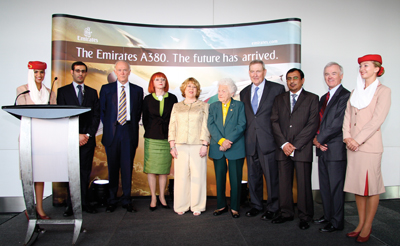
Features
Operations
The Emirates Question
“That takes a while to recalibrate your thinking . . . you realize that this is a difficult, complex air transport policy.”
September 27, 2010 By Peter Pigott
On March 9, 2010, Calin Rovinescu, Air Canada’s chief executive, accused Emirates of telling “fairy tales” about the economic benefits that greater access would create in Canada. “Simply put, the market between Canada and the UAE has not developed to the point where more capacity is warranted, period, full stop” Rovinescu told the Vancouver Board of Trade. Andrew Parker, Emirates senior vice president fired back saying his airline’s passenger loads between Toronto and Dubai had a load factor of 89 per cent in 2008 and 91 per cent in 2009. Emirates carried 99,288 passengers on the Toronto-Dubai route in 2008 and 122,870 people last year. “It is the Canadian consumers that are the losers as Air Canada benefits from protectionist rules that are preventing Emirates from expanding in Canada.”
 |
|
| Main: Tim Clark, president of Emirates stands third from left. Beside him stands: Mary Heron; The Honourable Diane Ablonczy, P.C. M.P., (at the time she was Minister of State for Tourism and Small Business, she is now Minister of State (Seniors)); Hazel McCallion, mayor of Mississauga; The Honourable Gerry Phillips, Chair of Cabinet, Government of Ontario; UAE Ambassador to Canada HE Mohamed Abdulla AlGhalfi; Lloyd McCoomb, president, Greater Toronto Airports Authority.
|
Wings journalist Peter Pigott recently met with Andrew Parker in Dubai to make some sense of this war of words. Here is part of their conversation.
WINGS: Calin Rovinescu has said that allowing Emirates greater access to Canada would shrink Canadian airports to “stubs” and that instead of “owning the podium,” (the hub podium) Canada would be surrendering it. Strong words. How did this all begin?
PARKER: You look at the history of Canada, very prosperous economy and a G8 nation, so you would therefore think that securing access couldn’t be difficult. You look at the rest of the world – it is liberalizing, opening doors – so you trot off to Ottawa and you have these meetings. They’re friendly, particularly among the politicians. They agree it’s a no brainer – we want an import/export market to have access to where Air Canada doesn’t fly. No problem they say. But then you meet with the Transport Canada officials and it’s a completely different attitude. And that takes a while to recalibrate your thinking. You think – I must have misheard them or I caught them on a bad day. But then after your second, third, fourteenth, and twenty-first meeting, you realize that this is a difficult, complex air transport policy. That is going to take an awful amount of effort to win the day.
WINGS: Rovinescu has also warned that Emirates’ real aim is to dump its excess capacity into the Canadian market, just as it has elsewhere in the world. Is it as dire as all that? What would the impact be on Air Canada?
PARKER: Take our proposition for what it is – a daily service into Toronto on the A380, and then a daily service to two points out west. Of course we would not operate an A380 to Calgary or Vancouver; it would be a 777 – all nonstop to Dubai, over the pole, 14 hours. So if you take our proposition, it represents in terms of Canada’s air transport market two per cent – that’s my definition of minimal. How would it impact Air Canada? I think Air Canada has a service to Tel Aviv – but beyond that there’s no service to the Middle East, which is a shame. Here’s a region of 280 million people – one of the most prosperous regions in the world, collectively a huge trading partner to Canada, but there’s no direct air service (from Air Canada) – other than our three flights from Toronto.
Air Canada is no small airline; it’s got a big international network and is member of Star Alliance. Where I think this debate is being misled is that we have never asked for “Open Skies” – we offered “Open Skies” here and we have “Open Skies” with dozens of countries. We know that it is a proposition that would never fly so we try to be pragmatic which is why we have made the proposal that we have. People are being misled.
WINGS: So if Air Canada flew to Dubai to take advantage of this untapped market, Emirates would have no problem with this?
PARKER: Absolutely none – we would welcome the competition. We have “Open Skies” here – we have 131 carriers flying in to Dubai, the highest of any airport in the world for commercial carriers.
WINGS: Canadians see “Open Skies” and think how unfair – you are trading one airport in the UAE for five major airports in Canada. We’re giving up Calgary, Vancouver, Edmonton, Toronto, and Montreal for Dubai. Are we surrendering the podium as Rovinescu says?
PARKER: That’s not true – for one thing, the UAE also has Abu Dhabi and Sharjah – but it is what it is. We can’t change our geography, and as to giving up – what are Canadians giving up? Their consumer interests? The import/export markets that this would open up? This is a debate purely about Air Canada not the Canadian consumer. As you recall, Transport Canada did exactly this with Singapore Airlines – another great airline that abandoned the Canadian market – to the detriment of Canadian consumers.
WINGS: Rovinescu told the Vancouver Board of Trade that there are already more airline seats being flown between Dubai and Canada than there are people to fill them. Was he wrong? If that is true, why doesn’t Emirates market their flights in Canada? There has been no advertising.
PARKER: Emirates doesn’t advertise because our three A380 flights from Toronto are 90 per cent full. The A380 has 489 seats, so you are looking at minimum 450 seats filled each flight; and in the airline business, that’s as good as it gets. There is very little point to us advertising now because we open the aircraft door and it fills to capacity.
WINGS: The Indian subcontinent? Why is this so?
 |
|
| Andrew Parker is Emirates senior vice president.
|
PARKER: Because of the number of connecting flights that Emirates has through Dubai to India, Pakistan, Sri Lanka and Bangladesh. That’s our backyard. There is a huge number of Indo-Canadians and we fly to eleven cities in India. To return to your previous question, we don’t need to advertise because the travelling public in Canada are working it out for themselves. In other words, how am I going to get to Chennai? I can go Emirates to Dubai, and we connect twice day to Chennai, or I can go through Frankfurt. Lufthansa also flies to India but we are sensitive to the nationalities we fly – we have everything from Bollywood movies to Indian diets to local dialects spoken by our cabin crew.
WINGS: But if Air Canada doesn’t fly to the Middle East, India, Pakistan, Bangladesh or Sri Lanka – and could only profit by bringing traffic on connecting flights into Toronto, why are they fighting Emirates expansion so hard?
PARKER: Two magic words: Star Alliance. If you went to Lufthansa’s Canada website – its banner ads were “Fly Toronto to Mumbai,” or “Fly Toronto to Dubai.” Its hub is Frankfurt. It tells you something about the nature of its service. It’s not Air Canada. . . .
WINGS: Bruce Cran, the president of the Consumers’ Association of Canada said that the voices of consumers are being lost in this war of words between Air Canada and Emirates Airlines. He thinks that Transport Canada should be consulting consumers about Emirates’ attempt to gain new access to
Canadian airports.
PARKER: We’re often told by Transport Canada that the problem is there isn’t a big enough hurdle for a 6th Freedom market between Dubai and Canada. (The 6th Freedom is the right to fly from a foreign country to another one while stopping in one’s own country for non-technical reasons). We don’t believe that, but even if you accepted that, why is our 6th Freedom traffic somehow different to Lufthansa’s freedom traffic? Frankfurt is a lovely city but I don’t think Canadians are going there for their holidays. Frankfurt’s a connect to Africa, Dubai, India. That’s what this argument boils down to unfortunately – it’s okay for some, but not for others.
WINGS: Is it because Emirates isn’t part of the Star Alliance?
PARKER: No. You look at Singapore Airlines. They’re part of Star Alliance but even they couldn’t break the Lufthansa grip on Transport Canada. Transport Canada raises Australia as a negative – that when Canberra allowed Emirates into Australia, Qantas suffered. The Australians laugh at this. They said that when they let Emirates in, the Middle East market exploded for them. Did you know that the Emiratis are the highest yielding tourists in Queensland today? Australian produce, wine, sporting goods and car parts are carried in the belly holds of Emirates to Middle Eastern markets. We’ve also opened up the European market for Australian exporters. Qantas has no problem with it. They only fly to London and Frankfurt; we fly to 23 European destinations. It can be the same for Canada as well.
WINGS: What about jobs for Canadians? Emirates says the expanded service would add 275,000 new passengers to the airports, bring $480 million of economic benefits and create 2,800 new jobs in Canada. In a post recession economy, that must account for a lot.
PARKER: I think that’s why we got the local mayors, chambers of commerce and three provincial premiers on board – the fact that the premiers of B.C., Alberta and Ontario all wrote to Prime Minister Harper and former Transport Minister John Baird saying please give Emirates access. The business leaders, mayors and premiers see it for what it is; we will come in and hire people at the airport, we will open an office downtown, we will start marketing and advertising, we will hire chauffeurs to drive premium class passengers, we will set up an aero engineering function in southern Ontario. . . If you look at wherever we’ve gone in the world you build a business around those local substantive services. You have to bring in spare parts, you have to have local maintenance contracts, you increase your suppliers, you increase catering. Even without the increased access, we have hundreds of Canadian pilots working for us – they’re highly skilled and thought of.
Look, we have had 10 years of polite conversation with Transport Canada and two years ago we decided to more confidently state our case – to do studies, to find friends and supporters. Because after a decade what are your options? You can walk away like Singapore Airlines – and let the protectionists win and the Canadian consumer lose. Or you can keep persevering. We have no intentions of giving up.
For other views on this contentious issue, please refer to the Op/Ed in the Wings July/Aug issue by Captain Paul Strachan, president of the Air Canada Pilots Association.